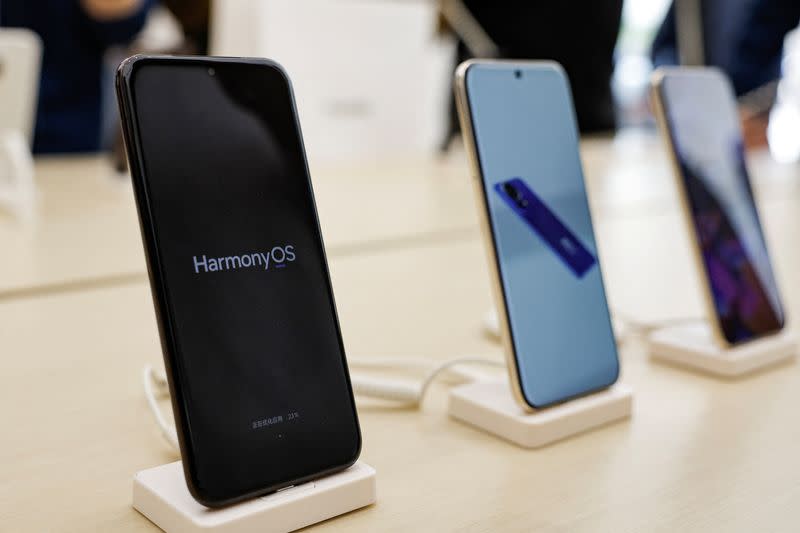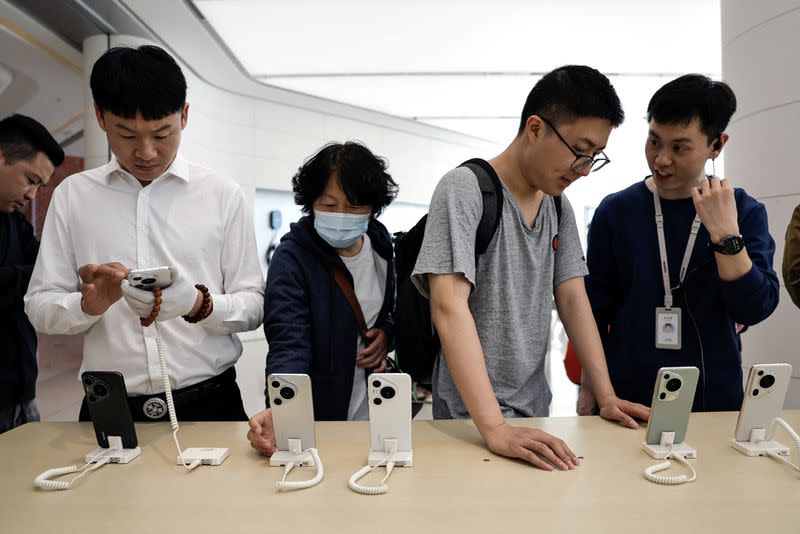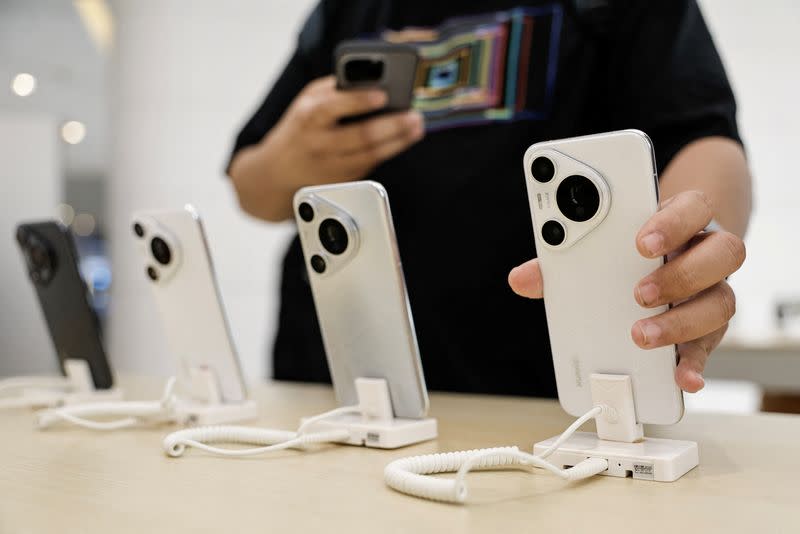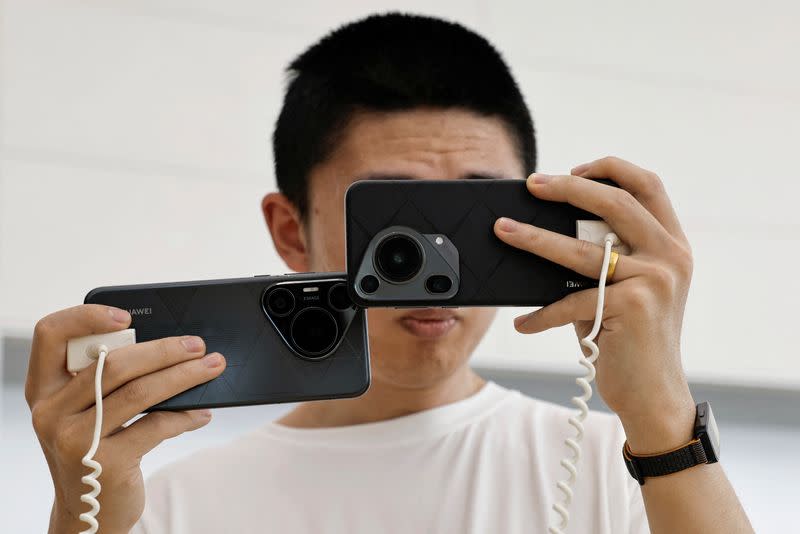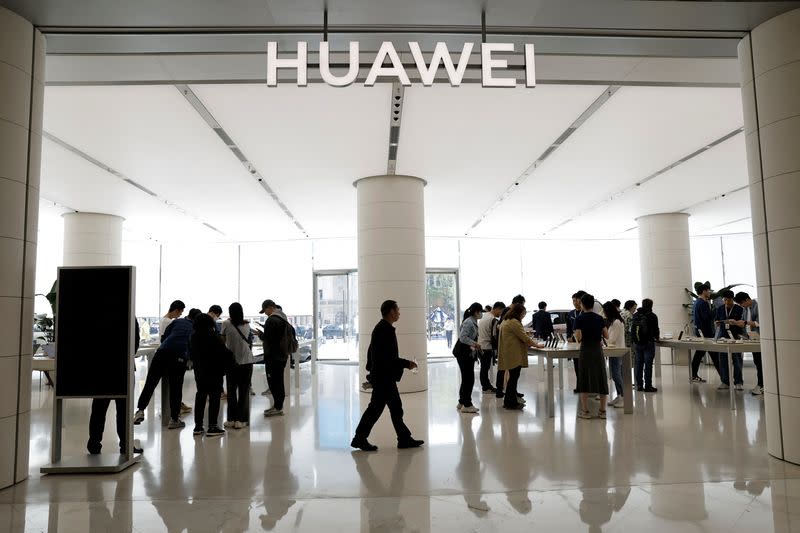Huawei starts sales of new Pura 70 smartphone to crowds amid chip scrutiny
By Josh Ye, David Kirton and Brenda Goh
HONG KONG/SHENZHEN/SHANGHAI (Reuters) -Chinese technology giant Huawei started selling two models of its highly anticipated, high-end Pura 70 smartphone series on Thursday that many analysts expect to contain an advanced China-made chip like its Mate 60 handset.
The Pura series developed by the Shenzhen-headquartered company has advanced cameras and is known for its sleek design, while the Mate series emphasises performance and business features.
Chinese state media celebrated the launch of Huawei's Mate 60 series last year as a triumph over U.S. sanctions on the firm, as the handsets contain an advanced China-made chip whose computing power analysts consider is only a few generations behind chips used by Western tech giants Apple and Google.
Eric Xu, Huawei's acting chairman, on Wednesday told a forum in Shenzhen that the company also plans to roll out a Mate 70 smartphone this year.
The Pro and Ultra versions of the Pura 70 were available on Thursday, while the Plus and base versions will begin sales on April 22. The phones were out of stock at Huawei's official online store just a minute after sales started, and hundreds of the brand's fans lined up at Huawei stores in Beijing, Shanghai and Shenzhen.
One customer, Lucas Zhuang, tested the network speed of the Pura 70 and said it was at the level of 5G. Washington has banned the licensing of 5G chips to China but Huawei's Mate 60 phones were already able to achieve 5G speed in many cases despite Huawei not branding it as 5G.
"We didn't know what chip the Pura 70 has inside. We'll only find out after buying it," Zhuang, who already owns the Mate 60, told Reuters after waiting in line at Huawei's flagship store in Shanghai.
"But we believe ... the chip it has will certainly meet people's needs."
Ivan Lam, a senior analyst at research firm Counterpoint, said he expected shipments of about 60 million units from Huawei this year, with the Pura 70 series being an important catalyst. Last year, Huawei sold about 32 million smartphones.
"There may be some shortage at various channels but supply will be much better compared to when the Mate 60 was launched. We don't expect any long-lasting shortage," he said.
The Pura 70 series has four variants: the 70, the 70 Plus, the 70 Pro and the 70 Ultra. The starting price for the Pura 70 series is 5,499 yuan ($760.06).
CHIP CHALLENGE
The launch of the Mate 60 Pro last August led to a spike in Huawei's smartphone sales. According to Counterpoint, in the first six weeks of 2024, Huawei's unit sales rose by 64% year-on-year. Apple's iPhone sales in China fell 24% during the same period.
Huawei’s Kirin 9000S chip was reportedly manufactured by China's Semiconductor Manufacturing International Corporation (SMIC) despite U.S. export restrictions seeking to limit Beijing's chip-making capabilities.
After the launch of Pura 70, multiple online reviewers have immediately livestreamed the process of them tearing down the phone over Chinese social media, with thousands of Huawei fans tuning in. According to these reviewers, the smartphone feature the Kirin 9010 chip, which appears to be a slight upgrade from the Kirin 9000s in the previous Mate 60 Pro.
A few reviewers also remarked the phone did not get hot as quickly as the Mate 60.
Huawei's new chips were seen as a symbol of China's technological resurgence despite Washington's ongoing efforts to destroy its capacity to produce advanced semiconductors.
The Biden administration began a review of the chip earlier this year and said last month that SMIC might have violated U.S. export rules, adding it was still evaluating the situation.
Besides targeting China's chip manufacturers, the U.S. has imposed trade restrictions on Huawei since 2018, viewing the company and its products as a national security risk, which the company denies.
Elaborating on the pending Mate 70 smartphones on Tuesday, Xu said the goal is for it to use a "pure" version of its HarmonyOS operating system, developed in 2019 after U.S. sanctions cut Huawei's access to U.S. technologies such as Google's Android.
HarmonyOS had relied on the Android application ecosystem but Huawei plans to cut that relationship and make HarmonyOS independent and able to compete with Apple's iOS and Android, he added.
($1 = 7.2350 Chinese yuan)
(Reporting by Josh Ye in Hong Kong, David Kirton in Shenzhen and Brenda Goh in Shanghai; Additional reporting by Liam Mo in Beijing; Editing by Jacqueline Wong, Stephen Coates, Jamie Freed, Sonali Paul and Barbara Lewis)
